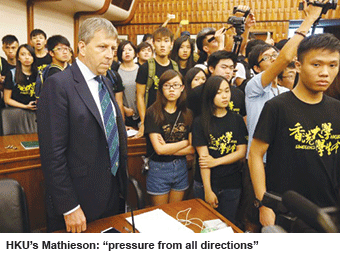 Not everyone rolled out the welcome mat for Peter Mathieson, former dean of the faculty of medicine and dentistry at the University of Bristol, when he was nominated vice chancellor of the University of Hong Kong (HKU) two years ago. Chan Yuen-ying, director of HKU’s Journalism and Media Studies Centre, blogged that “if a medical professor from the British city of Bristol, with a population of 430,000, is to parachute into Hong Kong to… safeguard our freedom, that’s a big joke”.
Not everyone rolled out the welcome mat for Peter Mathieson, former dean of the faculty of medicine and dentistry at the University of Bristol, when he was nominated vice chancellor of the University of Hong Kong (HKU) two years ago. Chan Yuen-ying, director of HKU’s Journalism and Media Studies Centre, blogged that “if a medical professor from the British city of Bristol, with a population of 430,000, is to parachute into Hong Kong to… safeguard our freedom, that’s a big joke”.
Despite the apparently Bristol-phobic Prof. Chan, Prof. Mathieson got the job and assumed office in April 2014. Within six months, the Occupy Central movement began, with thousands of people taking to the streets to protest China’s decision to screen candidates in the 2017 election for the semi-autonomous territory’s leadership. HKU, the territory’s oldest higher education institution, was on a political knife-edge, as its staff and students were among the leaders of the movement.
Occupy Central began in September 2014. Benny Tai Yui-ting, an associate professor of law at HKU, is regarded as one of the co-founders of the movement. Prof. Mathieson describes the time of the protests as “frightening in that I felt what I’ve described as a quasi-parental responsibility for 27,000 students”. “While I want to encourage freedom of speech and expression, I was also concerned about their safety. There were times last summer when there were real concerns that it could end in bloodshed. I felt a responsibility to try and do what I could do to try and avoid that.”
Prof. Mathieson did, at one point, address protesters on the streets. A video posted to YouTube in October shows him urging a group — listening in polite silence — to “put safety first” and “not provoke conflict”. Meanwhile Dr. Tai is the subject of an HKU audit committee inquiry into allegations that he mishandled donations in 2013 — which critics see as a case driven by political interference in the university in the wake of Occupy Central.
Has Prof. Mathieson felt pressure from government authorities in Hong Kong or China over the protests? Has there been any pressure over the Dr. Tai case in particular? “There’s pressure from all directions, from all sides of any argument, there’s pressure from staff, students, alumni, media, politicians, whoever else you might like to mention… I guess my job is to deal with that pressure and make sure I make decisions that are in the best interests of the university,” he says.
The “one country, two systems” pact between China and Hong Kong granting the latter a degree of autonomy runs until 2047.
Some expect that mainland influence will grow — does that present a problem for universities in Hong Kong as guardians of academic freedom? “We regard academic freedom and freedom of speech as absolutely core values. And I think part of my job is to articulate that. We can’t just take them for granted. We have to explain what we mean and why we think they are important,” says Mathieson.
(Excerpted and adapted from )